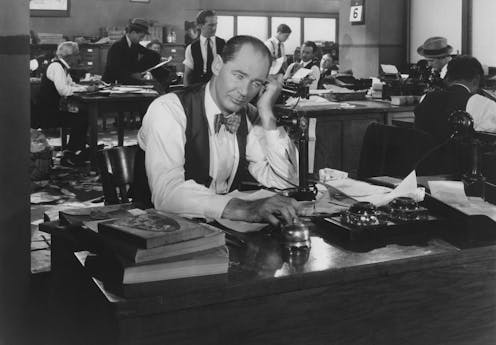Forget about a job for life. Today’s workers need to prepare for many jobs across multiple industries
- Written by Ruchi Sinha, Senior Lecturer, Organisational Behaviour & Management, University of South Australia

Both my parents worked for 30-plus years for their employers – they had lifelong careers at a single company. Growing up, they taught me the importance of “loyalty” and “commitment”.
But in a rapidly changing world, the concept of a job for life has become as rare as a dial-up internet connection.
This shift from stable, long-term employment and single-employer careers to a world where frequent job changes are the norm comes directly from globalisation, rapid technological advancements and the changing ideas about work.
Why such rapid change now?
Globalisation has turned the world economy into a giant, interconnected web. This has made job markets fiercely competitive and talent and opportunities[1] in the labour market more diverse and digitally accessible.
Jobs can be widely publicised and explored online and are no longer tied to your city of birth. Add to this the rapid technological progress. We now live in a world where the skills you learned yesterday might not be enough for today’s job market.
Read more: Older workers still struggle with work-life balance – and there’s no one-size-fits-all remedy[2]
The job market is transforming, with new careers emerging as automation and artificial intelligence (AI) advances. Risks and price policies can be efficiently assessed using AI, making insurance underwriters redundant while advanced software in banking and finance mean data analysis can be automated.
Online booking has reduced demand for travel agents and desktop publishers are being replaced by user-friendly software, which allows people to create their own materials. These changes highlight the need for professionals to update their skills and adapt to a technologically evolving job market.
As a result, career paths have become fluid and multi-directional[3]. It’s no longer just about climbing the corporate ladder and getting a regular paycheck; it’s about exploring different paths,[4] switching jobs and industries and sometimes even venturing into freelancing and the gig economy.
Workers’ priorities have been changed by the pandemic
The COVID-19 pandemic has thrown this trend into overdrive[6]. It has highlighted the need for workers and employers to be flexible to adjust to remote work, evolving job demands and uncertain prospects. Many people have reevaluated their career choices. They want greater work/life balance and adaptability in a changing world.
Increasingly, many workers are developing a personal brand[7], which involves building a narrative based on their individual skills. This is enriched through online education and skill development courses which makes them stand out in the workplace and more likely to access better opportunities.
But if employers don’t provide opportunities to use these skills, employees might decide to look elsewhere.
Does moving jobs equal disloyalty?
Loyalty is defined as an employee’s commitment to their organisation and its goals[8]. It means a willingness to put in extra effort and to uphold the company’s values and objectives. Loyal workers often identify strongly with their workplace, are reliable and view the organisation positively, even during tough times.
When long-term employees change workplaces, it does not mean they are disloyal. It signifies a change in priorities and a redefined loyalty bond. Employees are loyal to their employer and its interests while working there. But they also seek mutual growth and expect to be recognised and rewarded.
Career paths are now a kaleidoscope of experiences and opportunities. Instead of a career identity being about a company brand, it is about skills, experiences and the meaningfulness of the work. This transformation means career decision-making is more intricate, considering personal aspirations, market trends and family considerations.
How are employers coping with this shift?
Employers are rethinking strategies for career development with emphasis on providing diverse and flexible career opportunities, supporting continuous learning, and acknowledging unconventional career paths[10]. This approach is not only in response to the changing nature of work but also a strategy to attract and retain talent in a highly competitive job market.
Read more: Australians are concerned about AI. Is the federal government doing enough to mitigate risks?[11]
And for the individuals stepping into the workforce, the message is clear: take charge of your career development. Be proactive, embrace change, continually update your skills[12] and be ready to navigate through transitions and uncertainties. In these dynamic career landscapes, adaptability and resilience are your best allies.
The ability to adjust quickly to new roles, learn new skills, and navigate uncertain job markets is essential for career success in the modern era.
In summary, the career landscape is evolving as is the nature of commitment. The new mantra for organisations and individuals is adaptability, continuous learning and resilience[13]. As the world of work evolves, the key to success is embracing change and crafting a fulfilling, meaningful career that aligns with personal interests and life goals.
References
- ^ talent and opportunities (psycnet.apa.org)
- ^ Older workers still struggle with work-life balance – and there’s no one-size-fits-all remedy (theconversation.com)
- ^ multi-directional (www.emerald.com)
- ^ exploring different paths, (www.sciencedirect.com)
- ^ ESB Professional/Shutterstock (www.shutterstock.com)
- ^ trend into overdrive (www.ncbi.nlm.nih.gov)
- ^ personal brand (hbr.org)
- ^ commitment to their organisation and its goals (psycnet.apa.org)
- ^ Antonio Guillem/Shutterstock (www.shutterstock.com)
- ^ unconventional career paths (www.amazon.com.au)
- ^ Australians are concerned about AI. Is the federal government doing enough to mitigate risks? (theconversation.com)
- ^ Be proactive, embrace change, continually update your skills (www.tandfonline.com)
- ^ adaptability, continuous learning and resilience (www.mdpi.com)

















